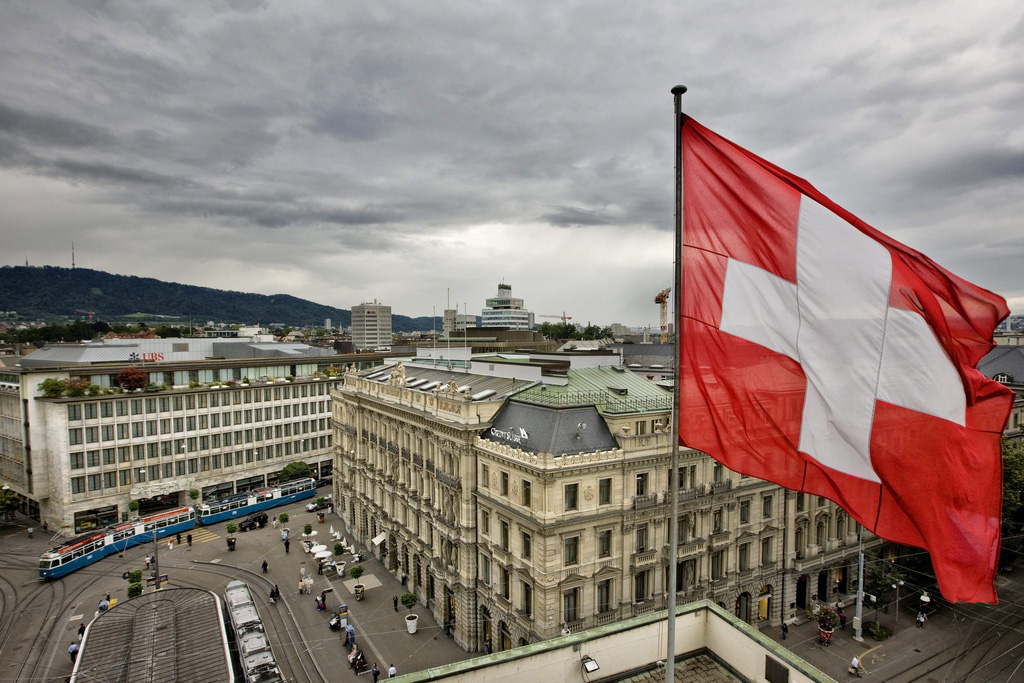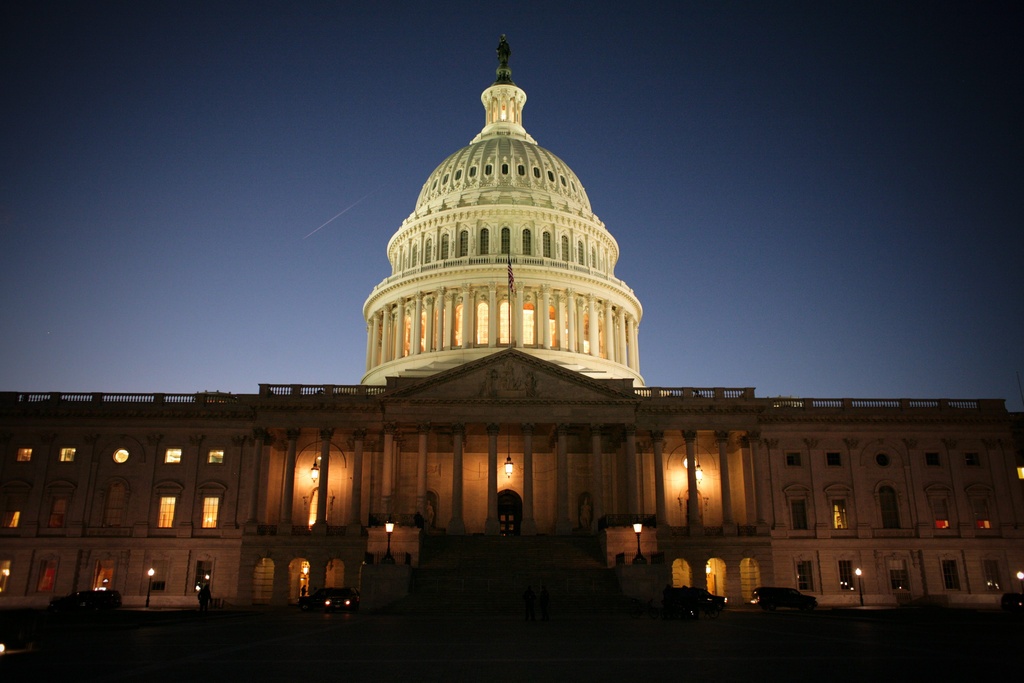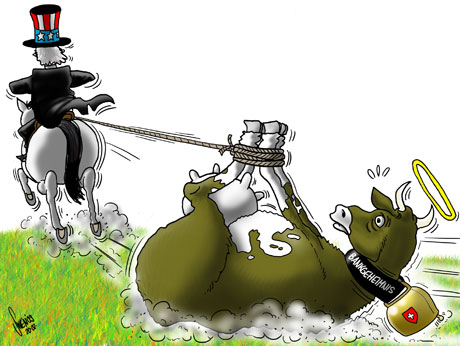Switzerland in eye of Bettencourt-Woerth storm

Secret Swiss bank accounts have been at the centre of a high-society political drama that has gripped France over the past few weeks.
French Labour Minister Eric Woerth, who has led a high-profile clampdown on tax evasion against Switzerland, has been linked to the bitter inheritance suit involving L’Oreal heiress Liliane Bettencourt, who is suspected of tax dodging.
The affair began when Françoise Bettencourt-Meyer, the estranged only daughter of 87-year-old Liliane, filed a complaint against celebrity photographer Francois-Marie Banier for “abuse of frailty” of her mother.
Banier is accused of tricking elderly Bettencourt, France’s richest woman, into handing over €1 billion (SFr1.3 billion) of assets, including works of art and an island in the Seychelles. Her net fortune is estimated at €17 billion.
Both he and Liliane Bettencourt reject the charges, insisting the gifts were made in good faith.
Judges last Thursday postponed the trial after secret recordings made by her butler emerged; the leaked recordings suggest the heiress was evading taxes by failing to declare assets to the French tax authorities.
Bettencourt and her financial advisor, Patrice de Maistre, are heard discussing undeclared Swiss bank accounts. These include one in Vevey worth €65 million and another in Geneva worth €16 million.
Last week Bettencourt quickly issued a statement indicating she would “regularise” her assets abroad.
According to last Friday’s Tribune de Genève newspaper, these two accounts were allegedly transferred last April to a life insurance in France for Liliane’s grandson.
Wider fallout?
The trial judges have decided they need more time to study the recordings, but the tapes appear to have much wider implications.
On several occasions, conversations between Liliane Bettencourt and De Maistre referred to Eric Woerth and his wife Florence.
Florence Woerth worked for De Maistre’s company Clymene, whose function is to invest the estimated €278 million in dividends that Liliane Bettencourt earns from her stake in L’Oreal, the world’s biggest cosmetic firm.
In the tapes De Maistre clearly says he gave the job to Florence Woerth after being asked to do so by Eric Woerth. Florence Woerth resigned from Clymene two weeks ago.
The tapes also show that Liliane Bettencourt made cash gifts to support political campaigns by members of the French UMP ruling party, including Mr Woerth.
Woerth has been accused of conflict of interests as he is both labour minister as well as the UMP treasurer and chief fundraiser.
The leftist opposition and unions have delighted in the affair, calling for the resignation of the minister, who is trying to push through sensitive pension reforms.
The minister, meanwhile, angrily denies allegations of any wrong-doing, saying he knew nothing about his wife’s activities and she knew nothing about the tax evasion, and he has the public backing of President Nicolas Sarkozy.
Tax evasion crackdown
A Geneva financial specialist criticised the minister in Friday’s edition of the Tribune de Genève: “Eric Woerth, who made tax evasion his priority, has attacked us for some time for being public enemy number one. He’s the one who got us on the OECD grey list of non-cooperative tax havens.
“But do you know, at the same time his wife, Florence, one of Liliane Bettencourt’s wealth managers, was often in the ‘family office’ of the French billionaire, two doors from the Hotel Angleterre?”
“Over the past two years Eric Woerth could not have failed to know that his wife was often in Geneva, and definitely not there to see the Geneva fountain.”
Until recently, Woerth was budget minister, with a mission of cracking down on tax evasion.
In August 2009 Woerth said his offices had the names of about 3,000 French citizens who held secret numbered accounts in Switzerland worth €3 billion. He said a portion of those names had come from an informant from the Geneva branch of British bank HSBC.
Both countries eventually settled the escalating row in January 2010 after France agreed not to use stolen data when requesting tax information.
Excessive behaviour
Whatever happens next, even if Bettencourt is found guilty of tax evasion, the Swiss bankers and institutions allegedly involved “have nothing to worry about”, said Geneva lawyer Dominique Warluzel.
Unlike American law, financiers are not liable for tax evasion under French law or the new double-taxation treaty between France and Switzerland, he told Swiss national radio.
Meanwhile, the Bettencourt-Woerth affair comes as other scandals embarrass the Sarkozy government.
Two French junior ministers, Alain Joyandet, secretary of state for cooperation, and Christian Blanc, in charge of a new transport plan for Paris, resigned on Sunday after scandals involving spending state money on a private jet and thousands of euros worth of cigars.
These revelations come at a time when the French government is looking to reign in “unjustified or excessive expenses” as the country struggles to bring down its deficit.
Simon Bradley, swissinfo.ch
Switzerland has been under continuous attack in the past year for helping foreign tax evaders hide their assets. The global crusade coincided with the devastation of the financial crisis leaving large holes in the budgets of many countries.
The OECD placed Switzerland on a “grey list” of uncooperative tax havens in April last year. The Swiss were removed in September after renegotiating more than a dozen double taxation treaties, but they have refused to automatically transfer information to tax investigators without proof of crimes.
A former German finance minister referred last summer to the Swiss as Indians running away from the cavalry. His Italian counterpart said that he wanted to “bleed dry” the financial sector in the Italian-speaking part of Switzerland.
Several countries, including Italy, France, Britain and the US, launched tax amnesties last year in an effort to repatriate assets from tax cheats. These are forecast to damage the Swiss offshore banking industry.
Switzerland was particularly annoyed at the aggressive Italian amnesty that saw surveillance and tailing of cross-border suspects going into Switzerland. The Swiss suspended talks on the new double taxation treaty in protest.
The most damaging tax evasion case involved the activities of UBS bank in the US. A year ago, UBS was fined $780 million after admitting to helping US citizens dodge taxes. It also handed over data of 285 account holders.
In September, the Swiss government agreed to transfer the details of 4,450 UBS clients to the US – in effect violating Swiss banking secrecy to prevent a ruinous court case for UBS.
Also last year a former employee of HSBC private bank in Geneva ran away with sensitive client data that he handed over to the French authorities.
In January an informant offered to sell the authorities in the German state of North Rhine-Westphalia the data of about 1,500 possible tax evaders with bank accounts in Switzerland.
In June the German government and the state of Lower Saxony said it had bought a CD said to contain the bank data of 20,000 alleged tax cheats with assets hidden in Switzerland.
The same month Spain confirmed it was investigating 3,000 accounts at HSBC bank in Switzerland over possible unpaid taxes worth up to €6 billion.

In compliance with the JTI standards
More: SWI swissinfo.ch certified by the Journalism Trust Initiative





You can find an overview of ongoing debates with our journalists here. Please join us!
If you want to start a conversation about a topic raised in this article or want to report factual errors, email us at english@swissinfo.ch.